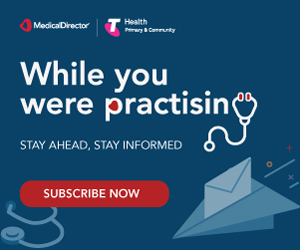Report reveals what patients want from doctors
MedicalDirector’s recent Patient Engagement Survey 2018, conducted in partnership with online appointment and eHealth platform, HotDoc, has revealed patients are demanding doctors give them a better informed, more engaging patient experience in an environment that privacy and security remains a top priority.
Patients want doctors to use more tech
Surveying over 2,000 patients across Australia, the report discovered 70% of patients want healthcare providers to better use digital tools, mobile technology and the internet to improve their patient experience.
Patients are particularly attracted to specific technologies that could help them better manage their appointments, communicate with their General Practitioners (GPs) and obtain test results and diagnoses.
But while this innovation is important and the research shows there is clearly an expectation for it, MedicalDirector’s CEO, Matt Bardsley, stresses we also need to respect the intricacies of a doctor-patient relationship and what it means to communicate in healthcare.
“We absolutely see a future where that is possible, but the doctor-patient relationship needs to be effectively managed to mitigate any risks to the patient on a case-by-case basis,” he explained. “Information always needs to be provided to patients with the appropriate support structures. That’s why the doctor needs to play an integral part in that communication, at all times.”
Patients want continuity of care
Australians want continuity of care, which is evident in the report’s findings of regular GP visits and ongoing loyalty to their chosen medical practices and doctors. And the positive outcome of continuity of care is further reflected in good health outcomes, as revealed by the finding that Australian patients, on average, rate their overall health quite highly.
The research found continuity of care is high in the Australian healthcare system, with most patients (80%) visiting their doctor at least every 6 months. Patient loyalty to their General Practitioner (GP) is also high, as 72% of respondents have been seeing the same doctor for more than 2 years.
“The statistics around patient loyalty to their GPs doesn’t surprise me, because I see that in my own practice. It is a good thing as continuity of care always leads to better health outcomes ” Dr Charlotte Middleton, GP and Chief Medical Advisor at MedicalDirector, said.
Patients want privacy
Australians demand a secure digital health ecosystem where the protection of their privacy is a top priority. In fact, when it comes to accessing medical health records, over 90% of respondents agree both security (availability, accuracy, safety and integrity of data) and privacy (confidentiality and appropriate use of data) are extremely important.
“We take universal sentiments about security being everything to patients very seriously, which is why we support that innovation through our partner ecosystem, and our solutions leverage the market-leading secure platform Microsoft Azure,” Bardsley said.
Patients want more health information
Education around health conditions continues to be an issue amongst Australian patients, with 78% of patients researching their condition online before seeing their GP. In addition, 90% say they would like more resources from their GP and fact sheets explaining their condition and how to better manage it. And as a significant finding, this particular research point has already received considerable industry and wider media attention.
“The finding that 88% of patients report getting no information beyond the doctor’s advice is problematic as it suggests that doctors likely overestimate their patients’ retention of information and underestimate the value of supporting information such as fact sheets or links to valuable online content,” HotDoc founder and CEO, Dr Ben Hurst, said. “In fact, 40 to 80% of information is forgotten immediately by the patient, which may be exacerbated further by factors such as ageing, cognitive deficit or anxiety. And poor recall of information is a major cause of non-adherence in patients.”
Bridging the gap towards patient centricity
While the report’s finding that high patient loyalty is encouraging, there is still a clear gap between patient expectations and the engagement, information and overall experience doctors are currently offering. To bridge this gap, healthcare providers need to explore how technology can increase their level of patient-centric care, and how new communication channels and resources can be utilised to offer more personalised patience experiences, enabling a future of healthcare that offers even better health outcomes.
To download our latest Patient Engagement Survey 2018 click here.









